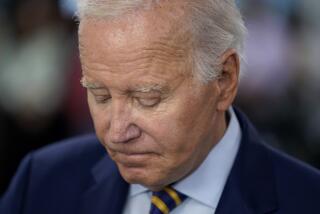Lawmakers’ Clashing Concerns Complicate Medicare Reform
- Share via
WASHINGTON — With all the suddenness and fury of a summer squall, a debate over long-term Medicare reform is raging in the nation’s capital. But the complexities of overhauling the massive health care program don’t compare to the intricate political calculations confronting policy-makers.
It is the miasma of short-term considerations, based on self interest, that may well determine whether Congress and President Clinton launch the country toward preserving Medicare’s solvency in time to accommodate baby boomers who reach retirement age in the next 20 years.
One immediate conundrum in the unfolding debate is why the Senate and the House adopted diametrically opposite stances on the issue.
The Senate, in its balanced-budget bill, voted overwhelmingly to raise Medicare’s eligibility age to 67 and require wealthier people to pay higher premiums. But the House’s balanced-budget bill was silent on those issues, and only later did it go on record to oppose an age increase in Medicare eligibility (with only 14 dissenters).
The knee-jerk explanation for the dichotomy is that House members are more wary of incurring voters’ wrath. “They run every two years,” said Sen. John B. Breaux (D-La.).
Yet 34 senators--18 Democrats and 16 Republicans--also are up for reelection in 1998--and all but five voted for the controversial Medicare changes.
In fact, said Sheila Burke, executive dean at Harvard University’s Kennedy School of Government, the Senate traditionally has been more aggressive in taking on such issues. “House members represent smaller constituents, and they are much more easily frightened,” she said.
Even more noteworthy than the Senate-House split is that it was Senate Republicans who led the charge. After all, virtually every Republican candidate in 1996 was attacked by Democrats over GOP proposals in the previous Congress to reduce spending for Medicare while seeking a huge tax cut.
“Yes, I give the Republicans credit for doing the right thing--but credit that is also asterisked with: That’s what we’re supposed to do,” said Sen. Bob Kerrey (D-Neb.), a Medicare reform advocate.
For Republicans, doing the right thing has some fringe benefits--as well as a potentially unintended consequence that they may live to regret.
On the plus side, the controversy is dividing the Democrats. That manifested itself in the Capitol late last week.
The two top congressional Democrats, Sen. Tom Daschle of South Dakota and Rep. Richard A. Gephardt of Missouri, joined seniors at a rally to denounce the proposed Medicare changes.
But an hour later, seven Democratic senators stood with five GOP colleagues to suggest that House members, Clinton and other defenders of the status quo get “a vertebra transplant,” in the words of Sen. Richard H. Bryan (D-Nev.).
Watching Democrats warily circling one another, some Republicans are all but gloating over another potential boon. By asking wealthy retirees to pay higher premiums, the GOP stands to gain some timely political cover--as champions of the middle class--while pushing for tax cuts that benefit the well-to-do.
So far, there has been little discernible outrage from seniors, according to many members of Congress, including those from states like Florida with heavy concentrations of retirees.
“There’s not been a spike of concern expressed,” said Sen. Bob Graham (D-Fla.). “I think there’s a recognition that structural changes are required.”
The other Florida senator, Republican Connie Mack, also has heard little from folks back home. But he added: “It’d be foolish for me to say there isn’t any risk.”
Ultimately, it’s those Democrats who have nothing against big government who may get the last laugh.
*
That’s because implicit in any increase in Medicare’s eligibility age is the corollary that seniors who aren’t quite old enough to qualify for the program should be allowed to buy into it. Otherwise, the nation may end up with a huge population of older folks without health insurance.
While the concept of early Medicare “buy in” may not be the only solution, it’s the most talked-about one among health care experts. And if adopted, the result would be something that most Republicans love to hate: a huge expansion of government health care.
More to Read
Get the L.A. Times Politics newsletter
Deeply reported insights into legislation, politics and policy from Sacramento, Washington and beyond. In your inbox twice per week.
You may occasionally receive promotional content from the Los Angeles Times.










